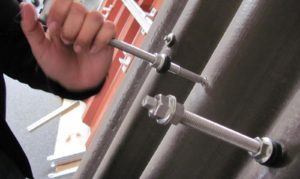 [1]
[1]It is important for the solar energy system to be securely fixed to the roof of all installations – and every roof has its own specific requirements. I would like to take the opportunity with this and other blog entries on the subject of “mounting systems” to present the typical mounting options to PV plant operators and installers for the most frequent roof types and give them recommendations.
Buildings with roof cladding can often be found in agriculture and industry. They are particularly suitable for cost-efficient direct mounting.
The trapezoidal sheet
As the profile rails with special clamps are riveted directly on the raised beads of the corrugated tin roof or fastened with self-tapping sheet-metal screws, the mounting times are shorter and less material is used. Due to the fact that the load is supported by the roof cladding with this solution, a sufficient static is required. If required by the static – for example in areas with high wind or snow loads – a mounting option will be used which shifts the load to the roof substructure. This involves the profile rails being fastened directly to the purlins with hanger bolts [2]. The metal sheet must be drilled out. EPDM seals are used which close the holes in a watertight manner to prevent rain water from subsequently penetrating through.
The sandwich roof
The sandwich roof is an insulated trapezoidal sheet roof. It may only be mounted with hanger bolts [2]/solar fasteners [3], as fastening on the outer shell is generally not permitted by the manufacturers for warranty reasons.
The corrugated roofing
Many roofs coverings made from corrugated eternit are mainly used in agriculture. Unlike sheet metal, the corrugated eternit covering is not stable enough for a PV system. As the substructure usually consists of wood, it is fastened to the purlins of the roof truss with hanger bolts. The hanger bolts are fastened to the high points of the corrugated elements. The pre-assembled EPDM seal prevents the penetration of water.
Buildings built before 1991 are often asbestos-contaminated. Holes in the corrugated eternit are not permitted. The roof must be professionally refurbished before a PV system is mounted.
Our solution: IBC TopFix 200
The tried-and-tested modular system is compatible with all common modules. The costs of the mounting system can be reduced for trapezoidal sheet roofs by using the “IBC TopFix 200 [4]” short-rail system.
The “IBC TopFix 200 delta support” is used to mount solar modules and is universally applicable on all pitched and flat roofs. Through pre-assembly, it is quick and easy to install and mount on the roof. The support can be mounted in 5 degree steps at inclination angles between 10 and 45 degrees to the sun, thereby ensuring perfect orientation of the solar modules, even on flat roofs.
Our YouTube channel [5] contains a whole range of short installation videos on the following topics:
Mounting solution for trapezoidal sheet roofs [6]
Mounting of IBC solar fasteners [3]
Mounting of the IBC hanger bolt [2]
Installation of IBC TopFix 200 delta supports – Assembly of the mounting system [7]
Part 3 of our series is all about “special pitched roofs”. Stay tuned.